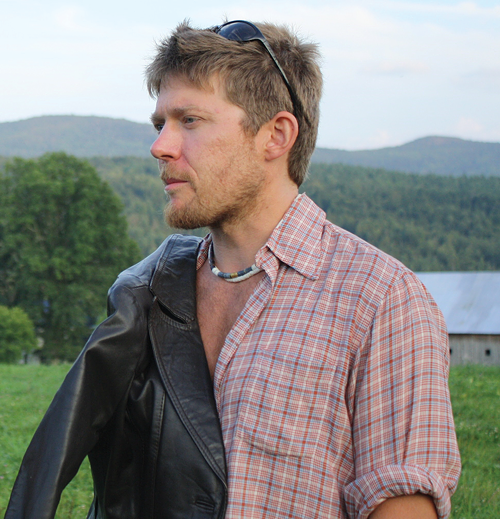No Graze Area
Christopher Ketcham rails against the exploitation of public lands in This Land.
By Scott Renshaw @scottrenshawNear the end of his new book This Land: How Cowboys, Capitalism, and Corruption are Ruining the American West, journalist Christopher Ketcham notes that "I'm glad my job as an investigative reporter is mainly to lay demolitions under corrupt structures, blow them up, walk away and let you people deal with the rubble." When you talk to him about the policies that are destroying public lands in the West, you get a clear sense of a guy who's not afraid to lob a few rhetorical bombs.
This Land is a striking cry of anguish over a landscape that has been savaged by livestock overgrazing, extractive industry and "regulatory" agencies in the federal government that have all but surrendered to local opposition. Chronicling a history of subjugation beginning 200 years ago, the book offers infuriating evidence of a broken system leading to a broken ecosystem.
Indeed, it was an assignment tracking that history that ultimately gave birth to This Land. From 2006-07, Ketcham researched an article for Harper's titled "They Shoot Buffalo, Don't They?", which dove into the story of America's near-complete destruction of the American bison, both to rid livestock interests of a competitor for grazing land and to deprive Native American tribes of a critical resource. Yet as he dug deeper into history, he also found a very specific connection between the present-day philosophy driving opposition to protected designations for areas like Bears Ears and Grand Staircase national monuments in Southern Utah, and the "dominionist" theology of The Church of Jesus Christ of Latter-day Saints—asserting humans' absolute authority to use the rest of creation—along with the church's early history of clashes with the federal government.
"You look at legislators who are self-declared Mormons, Rob Bishop and the rest of the Utah caucus," Ketcham says, "all are sworn enemies of public lands, faithful to the cause of the de facto privatization of public lands. The weight of Mormon history bears very much on how they view public lands."
The most maddening running theme in This Land is the role of agribusiness in pushing policies that not only cause ecological damage, and treat public lands as a resource for the personal exploitation of ranchers, but which taxpayers support. Estimates from the Center for Biological Diversity suggest that as much as $1 billion annually is spent on activities like killing predator species to preserve cattle and sheep, or destroying native plant species in favor of invasive grasses more favorable to grazing. "It's a form of socialism for the very wealthy," Ketcham says. "Many of these ranchers are modern-day barons; most are not the '99 percent.' ... But it's tough to go against the mythos of the American cowboy," he adds, using an exaggerated drawl for the final words.
This Land also explores in depth how little enforcement power agencies like the Bureau of Land Management exert in the face of political pressures and threats of actual violence. "Within the agencies," Ketcham says, "you have higher-ups who are broken by the level of influence they are forced to endure politically because of the nature of our system—a gross capitalist, extractive model. Meanwhile, lower down in the ranks, you have really good, smart people of conscience who are forced not to follow their conscience because it's too dangerous to do so ... I don't mean to malign the sizeable number of people who enter their jobs with good intentions, but fail to implement them, because they're trapped in a modality that doesn't allow for it."
Even more disheartening, Ketcham sees little hope for change politically, refusing to acknowledge that threats to the Western environment are all about President Donald Trump and Republicans. This Land recounts deals cut by the Obama administration to preserve Senate seats, or maintain alliances. "I don't see any difference" between the political parties, Ketcham says. "Sometimes the turning of the screw is slightly less, but there's no administration that has said, 'Nope, no more.' The rape of the land is bipartisan. Democrats just rape with a condom."
That kind of brutally frank language is what Ketcham feels is necessary when addressing a topic where people tend to tiptoe around ideas like the threat to the livelihoods of some people vs. the existential threat to entire species and ecosystems: "It's a matter of making a decision about whether you want to save the last wild things in the lower 48, or if you want to protect a special vested-interest, privileged minority. How about a little humility, restraint and altruism in regard to those last wild places?"
Ketcham closes by relating an exchange with a biologist while traveling through the Mojave Desert. When the author asked him why people should care about a threat to the habitat of the desert tortoise, "He gave me this look like he wanted to slam on the brakes and kick me the fuck out of the car," he recounts. "'Why does it matter? Because they've been here for millions of years. And we should respect that.' ... In the end, it's not all about us, this one blessed, sacred species constantly preening in front of the mirror. We need some other, larger cosmic connection, and we need places that connect us to it."
More by Scott Renshaw
-
Feature film review: THE BEAST
A filmmaker's compelling ideas get a bit tangled in references to his creative influences.
- Apr 17, 2024
-
Faces of Salt Lake County book and portrait reception
Images and personal stories in a new book reveal local demographic diversity
- Apr 17, 2024
-
Film Reviews: New Releases for April 12
Civil War, Escape from Germany, Coup de Chance, Hundreds of Beavers, La Chimera, Sting
- Apr 11, 2024
- More »
Latest in Arts & Entertainment
Readers also liked…
-
New TV for January 2023
Mayfair Witches, Velma, The Last of Us, Poker Face and more premieres
- Jan 4, 2023




